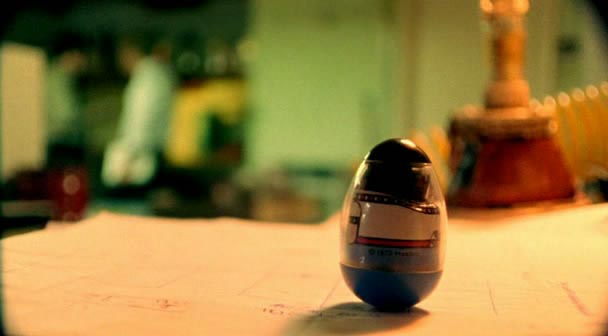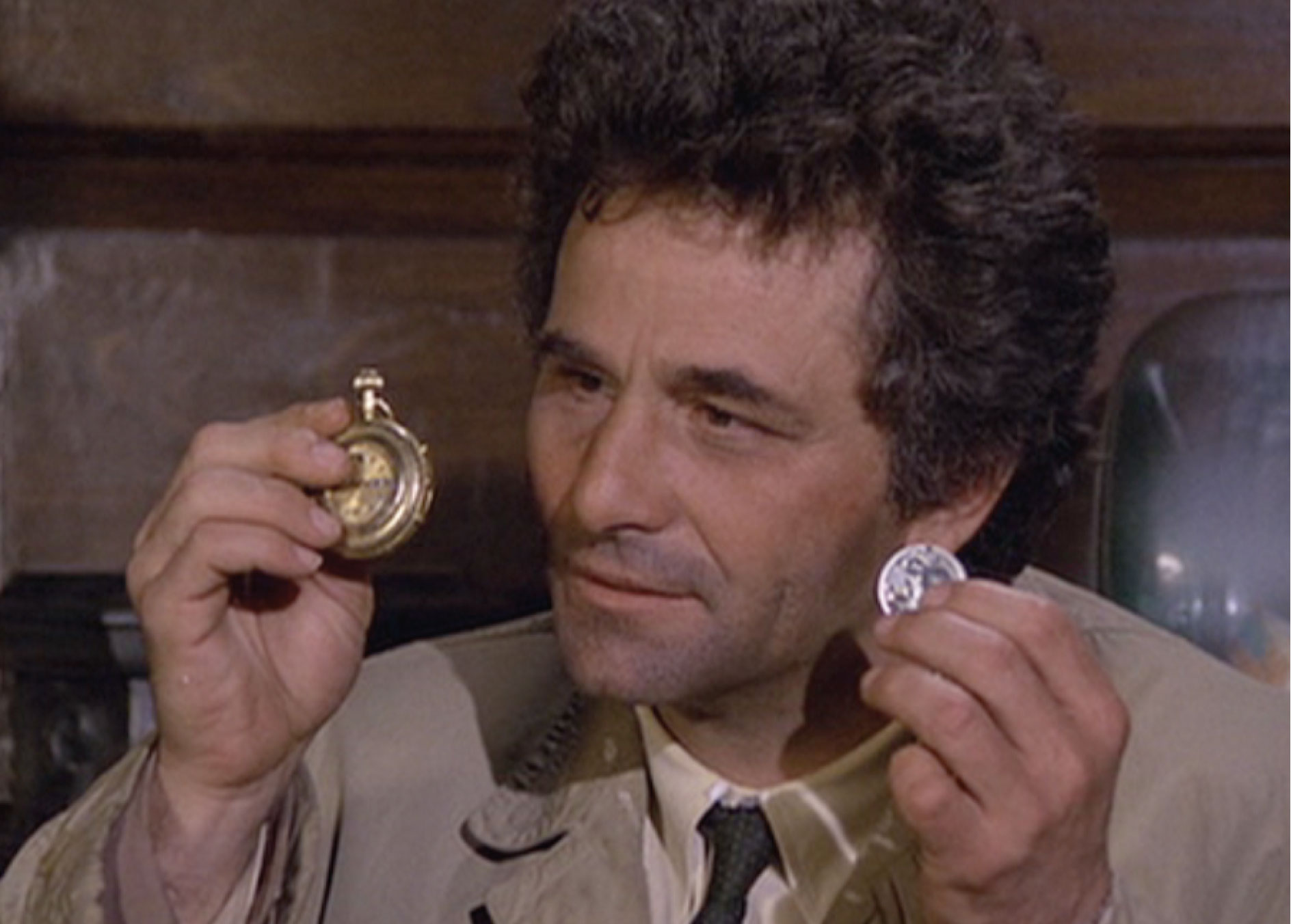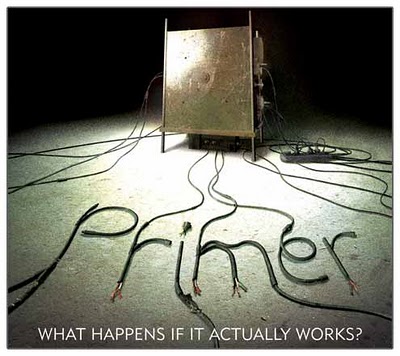The cult film Primer is a knot made out of $7000 worth of celluloid. It is a twisted and convoluted film, a recursive puzzle, that appears as a jumble precisely because it follows its own rules so meticulously. Carruth’s film spawned a slew of web forum debates and sites dedicated to various theories as fans tried to work out just what had happened in the film, and just what it was that Carruth’s time travelers, Abe and Aaron, together, had done. If you Google the movie you can find a book turned into a backwards blog called The Primer Universe where all the questions raised by the movie are, apparently, put to rest. If nothing else, the site claims to have nailed down the plot and/or the time line. However, one question that the Primer Universe site leaves unanswered is why it is that Carruth’s time travelers lose their ability to write properly. Why does their handwriting deteriorate after they’ve traveled in time?
Abe: What’s wrong with our hands?
Aaron: [has his arms tightly wrapped around his chest, his hands tight under his armpits] What do you mean?
Abe: [almost shouting] Why can’t we write like normal people?
Aaron: [quietly] I don’t know. I can see the letters… I know what they should look like, I just can’t get my hand to make them easily.
[Abe is rocking back and forth against the desk; Aaron is quietly jittering]
Abe: Try comparing it to your left hand.
Aaron: It’s almost the same.
There are a few theories floating around trying to explain this. One philosophy webpage suggests that the time travelers have been reversed by the process of time travel and that they actually are writing with what had been their left hands in the previous timeline. But if that were the case wouldn’t writing with what is their left hands in the new timeline fix the problem? Others argue that it is simply a matter of the machine inflicting brain damage on the time travelers, but if this is so it is a peculiarly specific kind of brain damage. Why would their ability to write letters be damaged but their speech centers be left completely intact? Why wouldn’t a time machine affect their memory?

Consider this: Their time machine first untethers the weeble-wobbles Abe and Aaron place inside it and then untethers Abe and Aaron themselves. The two of them oscillate between point A and point B inside the box, and like the weeble-wobbles before them, they get stuck in the median. They become unhitched from the normal flow of things before they are released.
Abe: Everything we’re putting in that box becomes ungrounded. And I don’t mean grounded to the earth, I mean untethered.
Now, I want to tell you my theory of why it is that the time travelers are losing their ability to write, but in order to do that I have to tell you about Hegel’s concept of the Negation of the Negation and an episode of Columbo first.
In Hegel’s Phenomenology of Spirit there is a procedure to which Hegel subjects every positive proposition, a procedure called dissolution. This process, or procedure, of dissolution doesn’t belong to Hegel alone. In fact, the Phenomenology seems to be Hegel’s attempt to demonstrate how all the philosophers who came before him were correct and how understanding just how these other philosophers were correct required us to discover this procedure of dissolution. As each idea falls apart we’re led from one idea to the next.
Here’s a quote from Hegel that I’ve lifted from Wikipedia: “Something becomes its other; this other is itself something; therefore it likewise becomes an other, and so on ad infinitum.” (Hegel, Georg Wilhelm Friedrich. 1874. The Logic. Encyclopedia of the Philosophical Sciences. 2nd Edition. London: Oxford University Press.)
So, let me explain this, in the Columbo episode “A Tribute to the Commodore” the owner of a sailboat company is murdered and it is Columbo’s job to find the killer amongst the socialites and hangers-on that had glommed onto the Commodore and his fortune while the Commodore was alive. Columbo particularly suspects the Commodore’s son-in-law and when Columbo expresses his suspicions the son-in-law objects:
“It couldn’t have been me. I left the yacht club at 12:45 aM. You can check with security to find out the time when I left.”
 To this Columbo says that the son-in-law’s alibi is the very reason he (the son-in-law) is the main suspect. “I asked myself, right from the beginning, why you would ask the guard for the time when you had such an expensive watch and his was just dimestore brand? Why did you ask him unless you wanted the guard to note the time?” Columbo asks.
To this Columbo says that the son-in-law’s alibi is the very reason he (the son-in-law) is the main suspect. “I asked myself, right from the beginning, why you would ask the guard for the time when you had such an expensive watch and his was just dimestore brand? Why did you ask him unless you wanted the guard to note the time?” Columbo asks.
No matter how clever the criminal is, every act the criminal undertakes to cover up the trail that leads to his guilt always creates another new trail. And what Hegel would say this means is that the criminal’s guilt always has to manifest as a cover-up. Certainly that’s how murder works on Columbo.

Aaron: We’re above the law?
Abe: Absolutely, well above it.
Here’s my theory about why the time travelers can’t write. The more they recursively travel back, the more they try to rewrite their lives, the more obvious their own signature on reality becomes. They are nothing but the scenes written and rewritten, and as they write and rewrite the less capable they become. To put this another way, they start to become aware of how reality is structured as a cover-up, of how there is no original and substantial reality that is grounding their attempts to make changes. As they realize this their ability to write is compromised.
The fact that they are untethered as time travelers is both what gives them the power to rewrite and it is why they find it so difficult. Consider how Aaron gets stuck in a loop, repeating the same party sequence again and again, trying to get it right, but never really arriving anywhere.
Aaron: So how many times did it take Aaron…as he cycled through the same conversations…lip-synching trivia over and over? How many times would it take before he got it right? Three? Four? Twenty? I’ve decided to believe that only one more would have done it.
And this problem of a standard, the problem of a finding a foundation, is manifest in multiple ways. Not only are they losing their ability to make letters that conform to standard, they also lose the authority who was originally backing their efforts. Granger, Abe’s girlfriend’s father, was the money man who backed the construction of the time machine, but when Abe and Aaron set off to create a paradox on purpose he shows up and stops them. He has apparently become a time traveler, or will become one. He comes back and apparently stops them from doing whatever it is that would require them to tell Granger to go back to stop them.
Granger is a paradox, a self-referential object who is his own standard. Of course, as such, Granger immediately falls down. He sinks into a coma, into incomprehension, as soon as either of the time travelers get near him.
Abe: Basically, you have absolute impunity to do whatever you want…nobody can touch you. What do you do?
The trouble in Primer, the reason the time travelers can’t write, is because they’ve become their own standards. They’ve lost Granger, lost all limits, and as such they’re dissolving. The question for them is whether it’s possible, given their situation, to create their own limits, or whether they’re stuck in an endless loop, in a repetition, forever.
Douglas Lain is a fiction writer, a “pop philosopher” for the popular blog Thought Catalog, the Partially Examined Life, and Right Where You’re Sitting Now. His most recent book, a novella entitled “Wave of Mutilation,” was published by Fantastic Planet Press (an imprint of Eraserhead) in October of 2011, and his first novel, entitled “Billy Moon: 1968” is due out from Tor Books in 2013. You can find him on Facebook and Twitter. He is the podcaster behind the Diet Soap Podcast.











Just a small note:
The parts of the human brain that deal with sound production are separate from the parts of the brain that deal with glyph interpretation.
You can have brain damage that leaves you unable to speak but able to read, hear, and write. And any combination thereof.
(Disclaimer: I read about this stuff on wikipedia a while ago, I’m not a medical professional.)
You did a very good job explaining what is going on in the movie Primer but I think that your explanation about why it is their awareness of reality that affects their ability to write. Why does it not effect their ability to walk or to talk? Is there something about writing that requires being tethered to reality?
I prefer the much simpler explanation that imperfect copies were made in the time travelling machine possibly causing dysgraphia (http://en.wikipedia.org/wiki/Dysgraphia) or just something that behaves similarily to dysgraphia.
DavidW,
Yes. I wanted to suggest that there was something about writing that required the writer to be tethered to reality, but not necessarily to what is Real. What I left out of this blog post was an explanation of why each version of the reality that is written can never be directly real but only a symbollic representation.
http://www.cla.purdue.edu/english/theory/psychoanalysis/definitions/symbolicorder.html
However, I’m interested to hear that you think that the time travellers in Primer were making copies of themselves that were somehow less real or less coherent than the originals. In fact, the mechanism of time travel is precisely designed to show that the same body is moved slowly into the same time line with itself.
“Why wouldn’t a time machine effect their memory?” Effect should be affect.
Actually, the book does mention it briefly. Their handwriting is so bad because they are basically copies of copies. Try to draw something with your other hand while looking in a mirror, rather than the paper itself.
PS Thanks for the link. I never imagined how many Primer fans were out there.
A simple interpretation is that their concept of directional bias has been challenged due to their moving in time in both directions. The muscles of the hand, being chiral opposites when composing unidirectional prose with spatial characters, would become conflated by this dissonance as handwriting was learned during the assumption of time only moving in one direction. Verbal speech, on the other hand (sic), can be reduced to a bilaterally symmetrical activation of muscles of the throat, diaphragm, etc.
~Mikeythaniel
Sapiophiles Anonymous
chidedneck(dot)blogspot(dot)com
I had the thought that it was so hard for them to write because it would be a physical remainder of themselves projected on paper, and/or their copies could read it in one of the infinite amounts of situations that could arise and then cease to exist or be extremely compromised, similar to how Granger just went comatose when presented with a more extreme situation, their hands (or the universe itself) are involuntarily restricting their chances of a paradox
I think it is just overexposure to Argon through repeat exposure in a confined space. “There are always leaks”
I thought their handwriting was messed through some connection with when they put their hands in the prototype field in the beginning of the movie to see if it would hurt. But I’m not sure now if that fits at all with the manipulations within manipulations anymore. It just seems a specific clue somehow.
I think it’s pretty simple, it takes time to learn to read and write and years to gain and perfect (although no one actually does perfect it) handwriting. As they keep going to different stages in time and untethering themselves they slowly begin losing the parts of themseleves that are built up over time. Something has to go first and I think in their case it was handwriting and if they continued to use the time machine more and more things that require time would be undone by the fact they are taking the aspect of time away from themselves.
I have yet another hypothesis, although I like the theory stated above about loss of directional bias from moving in both directions in time.
Myabe it has to do with conservation of information? The core issue with causality is transmission of information. Objects are prohibited from travelling faster than light because information can then be sent from what amounts to future time frames. If you could send a radio transmission of a horse race much faster than light speed, it could be received before the race is run (from the reciever’s timeframe) and allow you to then act on it and violate causality.
As Aaron and Paul start to bring information back with them from the future to the past allowing them to violate causality, some sort of principle of conservation of information degrades their ability to manually record information, or at least partially.
Looks more like the dexterity of the hands were going away. The right hand is more dexterous for a right handed person. If the dexterity goes down, then it becomes like the left hand.
Here’s an step-wise explanation of each of the timelines that are created by Aaron and Abe, helps appreciate the movie better:
http://digestivepyrotechnics.blogspot.com/2015/01/primer-plot-explained.html